NSG 6420 (NSG6420)
South University
Page 4 out of 382 results
Sort by
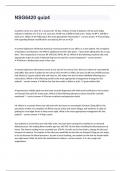
-
NSG6420 quiz4 well answered graded A+
- Exam (elaborations) • 2 pages • 2024
- Available in package deal
-
- $12.99
- + learn more
NSG6420 quiz4 well answered graded A+
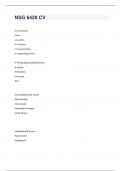
-
NSG 6420 CV question with 100% correct answers
- Exam (elaborations) • 25 pages • 2024
- Available in package deal
-
- $19.99
- + learn more
NSG 6420 CV question with 100% correct answers
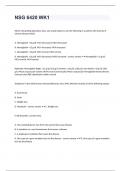
-
NSG 6420 WK1 questions with verified answers
- Exam (elaborations) • 7 pages • 2024
- Available in package deal
-
- $12.99
- + learn more
NSG 6420 WK1 questions with verified answers
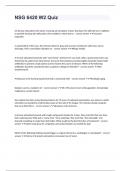
-
NSG 6420 W2 Quiz well answered
- Exam (elaborations) • 3 pages • 2024
- Available in package deal
-
- $9.99
- + learn more
NSG 6420 W2 Quiz well answered
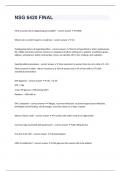
-
NSG 6420 FINAL questions with correct answers
- Exam (elaborations) • 10 pages • 2024
- Available in package deal
-
- $12.99
- + learn more
NSG 6420 FINAL questions with correct answers
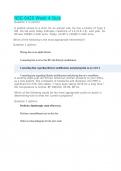
-
NSG 6420 Week 4 Quiz
- Exam (elaborations) • 6 pages • 2024
-
- $12.99
- + learn more
NSG 6420 Week 4 Quiz Question 1 (2 points) A patient comes to a clinic for an annual visit. He has a history of Type 2 DM. His lab work today indicates creatinine of 1.6 (0.6–1.5). Last year, his BP was 138/80 in both arms. Today, his BP is 150/80 in both arms. Which of the following is the most appropriate intervention? Question 1 options: Question 2 (2 points) A seventy-eight-year-old African American woman presents to your office as a new patient. She complains of headach...
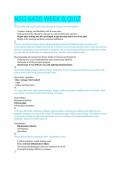
-
NSG 6420 WEEK 8 QUIZ
- Exam (elaborations) • 4 pages • 2024
-
- $13.49
- + learn more
NSG 6420 WEEK 8 QUIZ 1. Which of the following best describes the pain associated with osteoarthritis? Constant, burning, and throbbing with an acute onset Dull and primarily affected by exposure to cold and barometric pressure Begins upon arising and after prolonged weight bearing and/or use of the joint Begins in the morning and limits continued ambulation 2. Your 63-year-old Caucasian woman with polymyalgia rheumatica (PMR) will begin treatment with corticosteroids until the conditi...
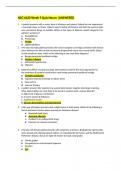
-
NSG 6420 Week 9 Quiz Neuro |ANSWERED
- Exam (elaborations) • 2 pages • 2024
-
- $9.99
- + learn more
NSG 6420 Week 9 Quiz Neuro |ANSWERED 1. A patient presents with a severe bout of dizziness and nausea. Patient has not experienced a traumatic injury or illness. Patient reports feeling off balance and feels the need to hold onto permanent things to stabilize. Which of the types of dizziness would categorize this patient’s symptoms? a. Disequilibrium b. Presyncope c. Vertigo d. Lightheadedness 2. A 45-year-old male patient presents with severe symptoms of vertigo combined with tinnitus...
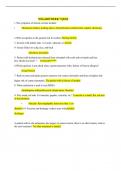
-
NSG 6420 WEEK 7 QUIZ
- Exam (elaborations) • 1 pages • 2024
-
- $9.99
- + learn more
NSG 6420 WEEK 7 QUIZ 1- The symptoms of chronic eczema include: • Thickened, leathery-looking skin or lichenification (called lichen simplex chronicus) 2- What occupation is the greatest risk for scabies-Nursing facility 3- Eczema with leather skin- is it acute, subacute, or chronic 4- Greasy flakes on scalp, face, and back seborrheic dermatitis 5- Patient with leukemia just released from a hospital with scaly rash on hands and feet, how should you treat? • Ivermectin***** 6- Whic...
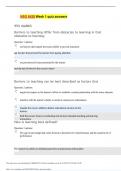
-
NSG 6420 Week 1 quiz answers
- Exam (elaborations) • 9 pages • 2024
-
- $12.79
- + learn more
NSG 6420 Week 1 quiz answers 95% MARKS Barriers to teaching differ from obstacles to learning in that obstacles to learning: Question 1 options: are barriers that impede the nurses ability to provide education are psychosocial issues presented by the learner Barriers to teaching can be best described as factors that Question 2 options: negatively impact on the learner's efforts to establish a mutual partnership with the nurse educator. interfere with the learner...

$6.50 for your textbook summary multiplied by 100 fellow students... Do the math: that's a lot of money! Don't be a thief of your own wallet and start uploading yours now. Discover all about earning on Stuvia


